The Renault Captur and Peugeot 2008 pack impressive practicality into a small footprint.
If you're shopping this pair of Gallic grocery-getters, which model is best for you? The Renault has excellent usability and a grown-up driving experience, while the Peugeot is more stylish and softly sprung.
Once you've chosen your favourite compact SUV, check out how much you could save on a nearly new or used model from Motorpoint.
Renault Captur vs Peugeot 2008 compared
| Renault Captur | Peugeot 2008 |
Pros:
| Pros:
|
Cons:
| Cons:
|
Styling and design
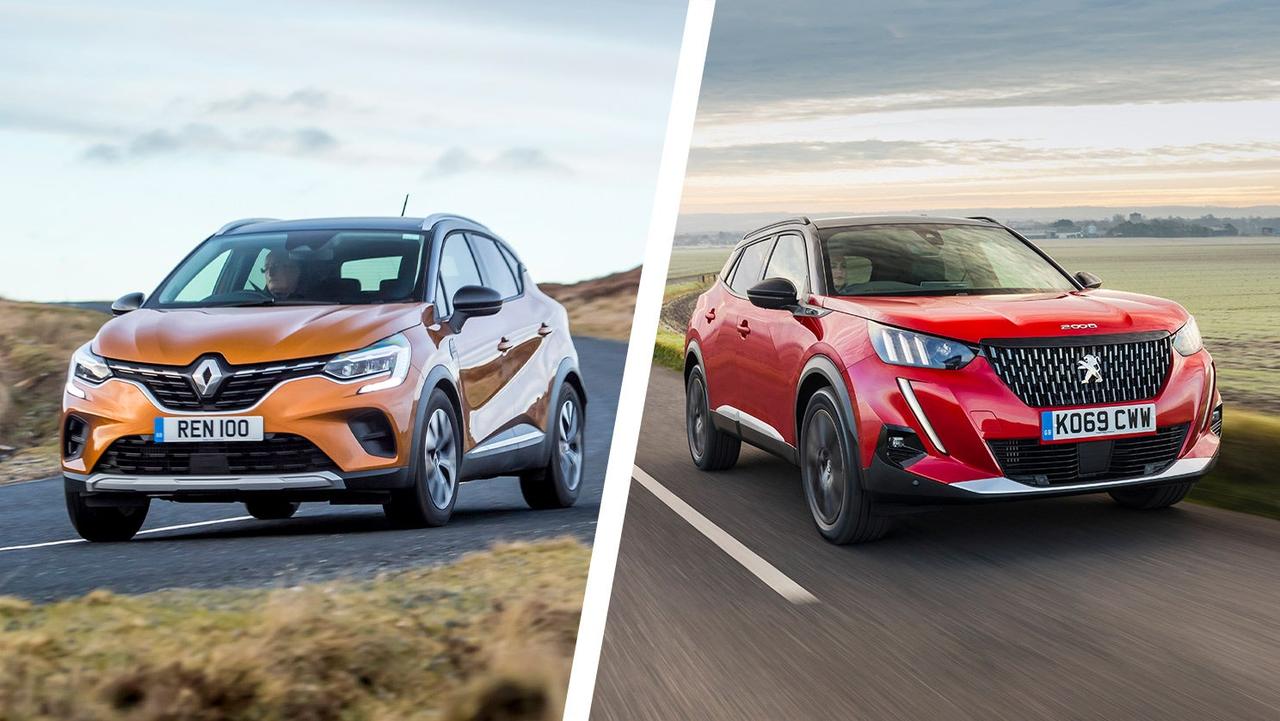
To our eyes, the Captur and the 2008 are two of the best-looking small SUVs on sale. The Renault has a more rounded shape, but it's details like the 'floating' contrast-colour roof, the hook-like headlights and the fluid surfacing down the sides that help it stand out. In person, it has quite an athletic stance for a small SUV, with the wheels pushed far out to its corners – a look that's more exaggerated on cars with big alloy wheels. We think the Captur also benefits from its wide selection of bright, metallic colours like red, orange and blue, so keep an eye out for those hues.
Where the Captur looks like an enlarged Clio hatchback, the 2008 feels like it's trying to mimic the looks of more traditional boxy SUVs. Its styling is more upright, with a broad, shield-like front grille, an almost flat roof and faceted, geometric body sculpting in place of the Captur's more organic styling. While the Peugeot's overall look clearly heads in a different direction to the Renault's, we think it's no less successful – it's a refreshing alternative to more conservative rivals like the Volkswagen T-Roc or more controversial designs like the Nissan Juke. Like the Captur, bright colours suit the 2008 best.
Interior and practicality
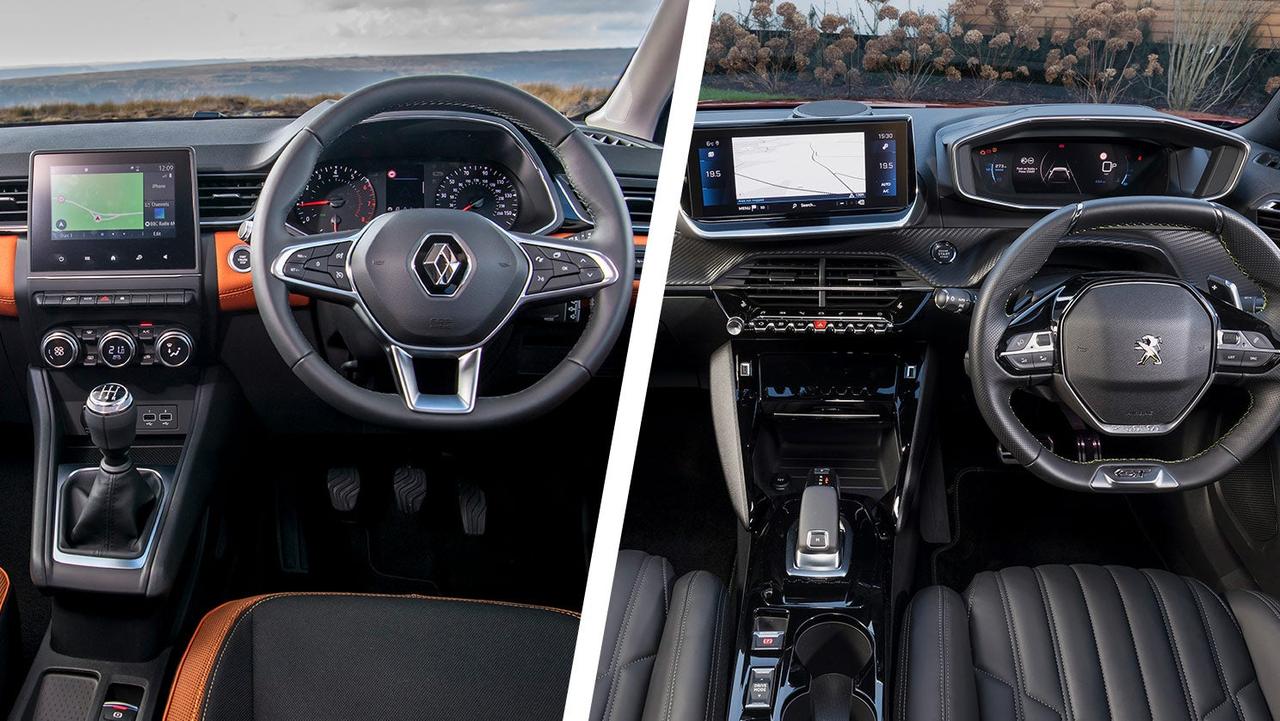
Neither car's interior is likely to rouse any complaints from occupants. The Renault feels well made and is extremely easy to use – climate controls are all proper physical knobs and buttons you can adjust at a glance, and the straightforward infotainment system sits well within reach. Simple buttons on the steering wheel place key functions under the driver's fingers, and avoid the risk of accidental presses like certain brands that have switched to touch-sensitive controls. That said, we're not fans of the stereo's fiddly on-screen volume control, nor the disappointing number of blanked-off dashboard buttons that cheapen the cabin.
Stepping into the Peugeot, it immediately feels posher, with more metal-effect trim and attractive materials used on the dash and door panels. It wins points for still having a physical volume knob for the stereo, and the elegant piano-style dashboard keys that control a handful of functions. However, adjusting the climate controls through the screen is annoying and fiddly, plus the infotainment system itself is slower and less intuitive than the Renault's. We like the 2008's distinctive small steering wheel and high-set gauges but you should check they work with your height and frame before buying.
Small SUV buyers usually want to take advantage of the extra practicality this body style offers over a traditional hatchback despite its similar footprint, and both the Renault and Peugeot score well here. The Captur is the more flexible of the two thanks to its sliding rear bench seat, giving you the option to choose between loads of legroom for tall passengers, or a much larger cargo area without having to fold the back seats down. While it lacks the seat-sliding ability of the Renault, there's still lots of space for adults or bulky child seats on the Peugeot's second row, and a square boot that'll handle a big weekly shop – or a smallish pooch – easily.
Engines and performance
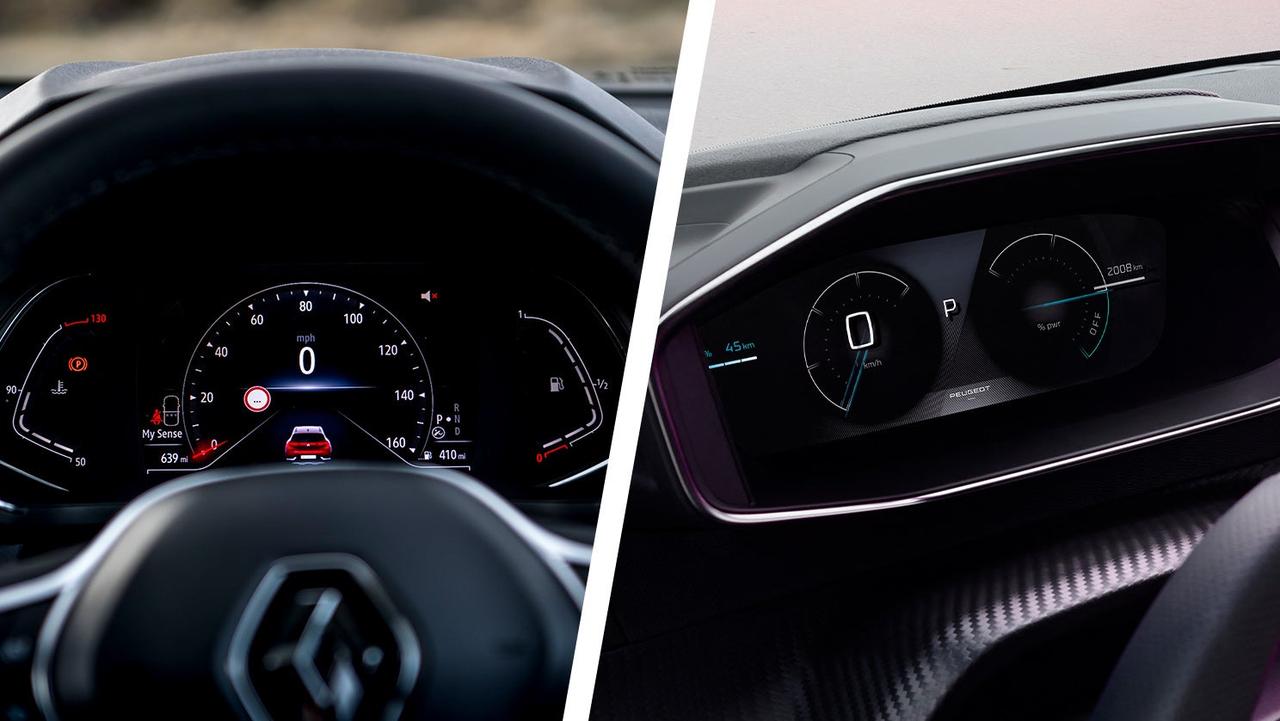
Earlier Capturs built until 2020 were available with a 1.5-litre diesel engine, which is noisy but efficient. All newer models come with either turbo petrol or hybrid power. The 1.0-litre TCE petrol engine is widely available on the used market with either 90 or 100hp, but we'd avoid this engine if possible because it feels slow compared to all its key rivals, requiring huge footfuls of throttle to coax it up to overtaking speeds. You can step up to a 1.3-litre TCE, which feels more relaxed, although it still lacks the punch under the bonnet you'll find in rivals. Our favourite engines, in fact, are the Captur's hybrid and plug-in-hybrid engines thanks to their zippy electric motors providing lots of power at urban speeds, but these are a little pricier to buy.
Meanwhile, most 2008 models uses the same 1.2-litre turbo petrol engine that's shared between Peugeot, Citroen and Vauxhall models, and it's a cracking unit. Models with 100hp have enough power to get by, while the 130hp versions could almost be called 'muscular'. You'll generally notice more engine noise in the Peugeot, but it's an easy tradeoff for the substantial improvement in acceleration. No hybrid choices this time round, but the Peugeot has the option of a fully electric model with a range of more than 200 miles and smooth, insistent acceleration off the line. You'll also find a few long-legged 1.5-litre diesel models for sale.
Driving
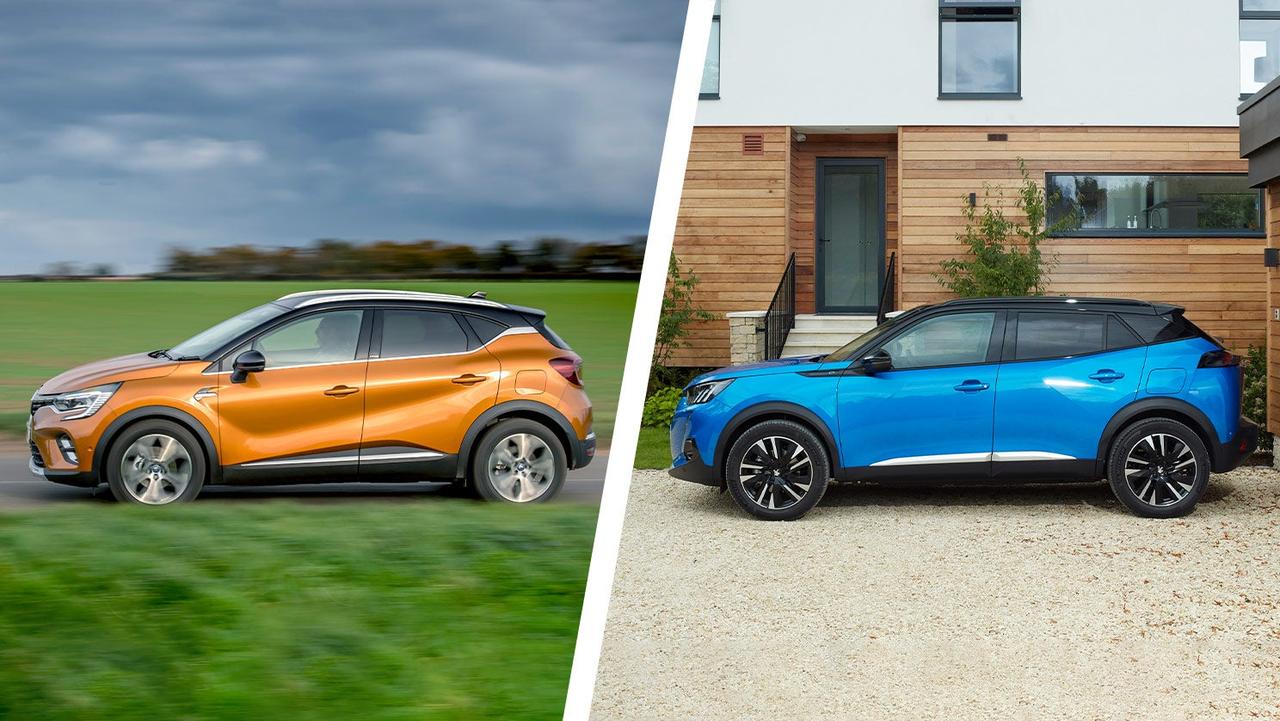
On the road, the Renault strikes an excellent balance between handling and comfort. There's plenty of compliance in the suspension, reducing the thud from large impacts and smoothing out small vibrations from rough surfaces. The calm ride doesn't compromise the handling, either, with solid body control and predictable responses to inputs. However, keen drivers won't be impressed by the artificial-feeling steering but the most serious complaint they'll have will be about the weedy petrol engines that need to be worked hard to make swift progress.
That's not a problem the 2008 suffers from. Even the entry-level 100hp 1.2-litre petrol engine feels relaxed on the move, while the 130 and 155hp models feel positively powerful by comparison. The handling is a little less impressive, however – it's easy to place the 2008 on the road and we like twirling its tiny steering wheel when parking, but there's noticeable body roll around corners and quick direction changes can cause the body to rock slightly from side to side. On the plus side, the slightly soft handling translates to a soft ride quality, with the 2008 floating over big bumps better than some luxury cars that cost several times more.
Value and reliability
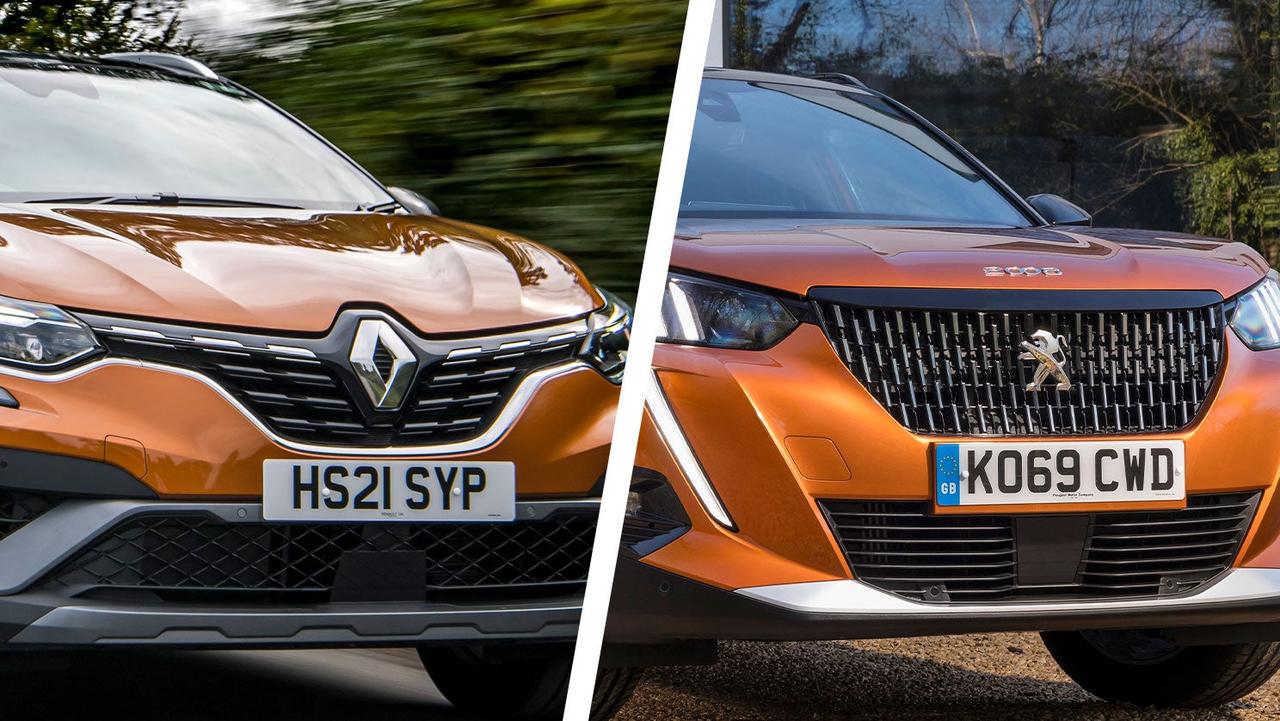
While they're priced very competitively as new cars, the Peugeot tends to hold on to its value a little better on the used market than the Renault. That means you'll pay a little more for a like-for-like 2008 than you will for a Captur, but it's worth bearing in mind that the Peugeot is faster across the board than the Renault so, if you cover more motorway miles, you might appreciate the 2008's extra overtaking power.
We've not heard of any widespread issues with either car, although it's important to keep on top of scheduled maintenance to help your car run properly. Renault began rolling out a standard five-year warranty from 2020 onwards – two longer than the industry standard – so used buyers might be able to take advantage of a little extra manufacturer coverage. Either way, you can purchase either car with an extended warranty that starts once the original coverage ends and protects you from unexpected repair costs.
Which is best?
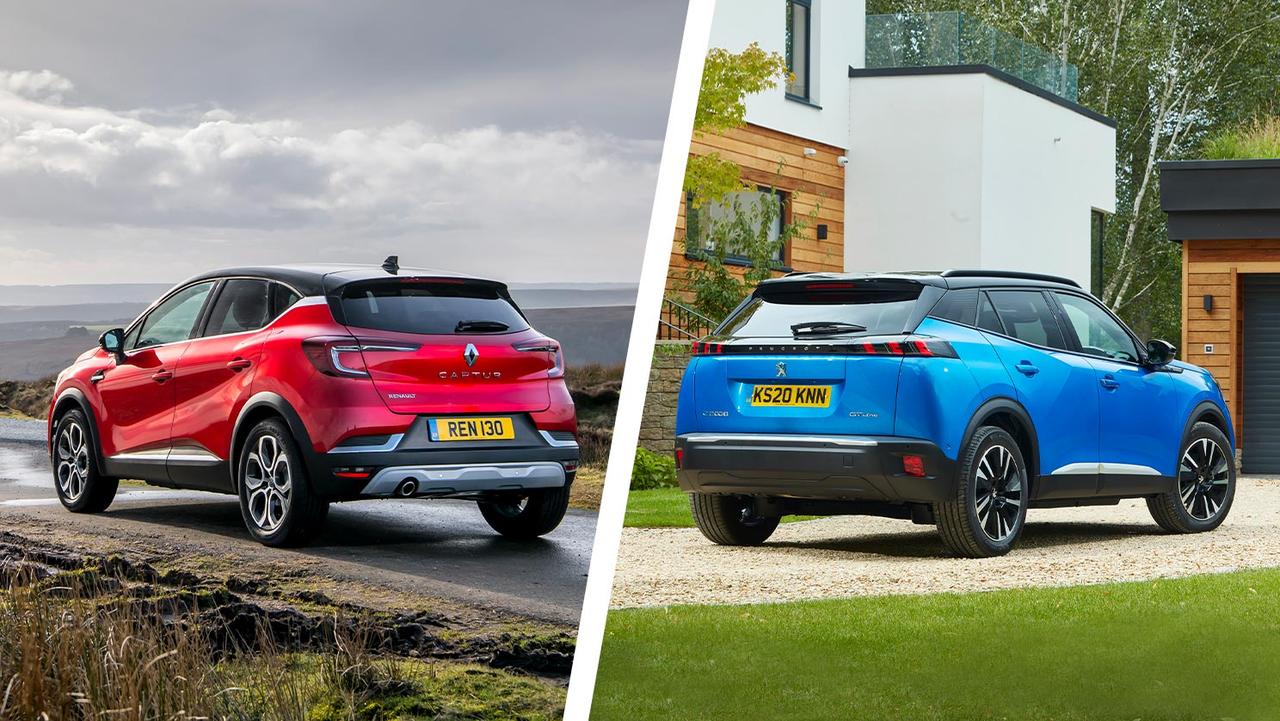
Buyers that pick the Captur will likely do so for its extra affordability, its slightly larger cabin and its easy usability. Those who pick the 2008, on the other hand, will probably prefer its more premium cabin and its broad selection of strong engines.
It's also worth bearing in mind your use case. If you cover lots of short trips and urban miles, you might be able to save money on your running costs either with the Captur's plug-in-hybrid engine or the fully electric e-2008. High-mileage drivers, on the other hand, should look to the 2008 lineup, which usually has a wider selection of diesel engines.
Take a look at the savings available on used Renault Captur and used Peugeot 2008 cars at Motorpoint. For more great options, check out our picks for the best hybrid SUVs.



































